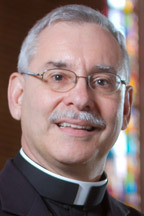
Bishop Anthony B. Taylor delivered this homily Oct. 26.
When we say that something is most important, it implies that everything else is less important — and not just as a matter of opinion, but in reality.
In Jesus’ time there was a school of thought that said that all 613 commandments of the Old Testament were equally binding. They all had been commanded by God and he expected us to obey all of them completely.
Ritual laws, moral laws, social norms, dietary laws, it didn’t matter. Remember the trouble Jesus got into for not washing his hands before eating? Or the grief they gave his disciples who were plucking grain to eat on the Sabbath?
We see it today on the topic of immigration when people chant, “It’s the law, it’s the law, it’s the law,” as if all laws have equal binding force.
In today’s Gospel not only does Jesus state clearly that some laws are more important than others, when a scholar of the law asks him which is the most important commandment of the law (meaning of the Torah, the first five books of the Bible) he gives a double answer: not one but two commandments paired together to form a single most important commandment of the Law because you can’t have one without the other: love of God and love of neighbor, God with all your heart, soul and mind, and your neighbor as yourself. These are not new commandments; Jesus is quoting Deuteronomy and Leviticus, but what is new is that he says that together they constitute the foundation not only of the other 611, but indeed of the entire Old Testament.
Jesus’ bringing these two commandments together is a great advance, but you know there is a big problem here. Most people think that this is the greatest commandment of all. But it’s not. What does our text say? The greatest commandment “of the law” meaning of the Old Testament.
And after all, loving our neighbor as ourself may or may not be all that much — a lot of people don’t love themselves much at all. Look at how they treat their bodies. Look at all the self-destructive choices they make.
The first half of this commandment will stand — love God with all your heart, soul and mind. But Jesus will revise the second half when he gives us what is in effect the Greatest Commandment of the New Testament: “Love one another as I have loved you.” Not just as we love ourselves, which is at best limited, but rather to love others more than we love ourselves, to love others as Jesus loves us, which is unlimited, sacrificial and to the death.
“No greater love is there than to lay down one’s life for others.” That’s the mystery of the cross. It’s also the revolution of tenderness to which Pope Francis calls us today.
Today we deal with many controversial topics rooted in many kinds of laws having to do with morality, social policy, human rights, decisions of our government and rules of our Church, but as we see, while they each have a claim on us, they are not all equally important. Indeed, beyond a certain point unjust laws become unenforceable and otherwise lose their binding force, even though they remain on the books.
Today Jesus is saying that the love of God and neighbor must be the foundation of all other laws — moral, social, religious and governmental — and as we shall see as the New Testament continues to unfold, unjust moral, social, religious and governmental laws will lead to rejection of God in the person of the Second Person of the Blessed Trinity, whom they were supposed to love with all their heart, soul and mind, and to the crucifixion of an innocent man whom they were supposed to love at least as much as they love themselves.
Please read our Comments Policy before posting.
Article comments powered by Disqus Priests can’t facilitate ‘religious exemption’ to vaccine
Priests can’t facilitate ‘religious exemption’ to vaccine
 Learn from the example of St. Bridget during pandemic
Learn from the example of St. Bridget during pandemic
 In crisis, rely on Jesus and Eucharist
In crisis, rely on Jesus and Eucharist
 Pause to thank God for all that he has provided
Pause to thank God for all that he has provided
 Stability and obedience only work if you live them
Stability and obedience only work if you live them
 Winning directory photo honors Our Lady of Guadalupe
Winning directory photo honors Our Lady of Guadalupe
 St. Paul says: How does the Bible define love?
St. Paul says: How does the Bible define love?
 6 steps to getting married in Diocese of Little Rock
6 steps to getting married in Diocese of Little Rock
 Most frequently asked questions on Catholic marriage
Most frequently asked questions on Catholic marriage
 St. Joseph a model of solidarity with immigrants
St. Joseph a model of solidarity with immigrants
 Two gifts after Jesus’ death: Virgin Mary and Eucharist
Two gifts after Jesus’ death: Virgin Mary and Eucharist
 Why we have an altar, and not just a communion table
Why we have an altar, and not just a communion table
 Pope: Wars should be resolved through nonviolence
Pope: Wars should be resolved through nonviolence
 Living relationship with Jesus Christ in the Eucharist
Living relationship with Jesus Christ in the Eucharist